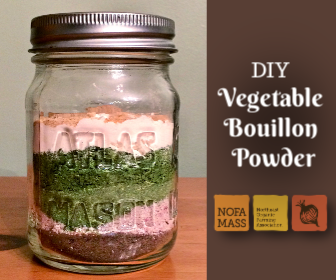DIY Vegetable Bouillon Powder with Dandelion Forest
F.O.O.D. Focus on the Organic Difference
vol. 4 November 9, 2018
Profile and recipe from Chris Samoiloff of Dandelion Forest, Princeton, MA
By Christy Bassett for The Organic Food Guide and NOFA/Mass
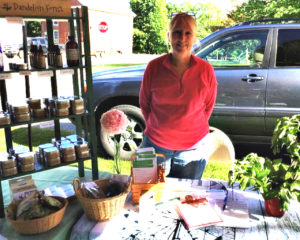
This week on the FOOD blog, Chris Samoiloff of Dandelion Forest in Princeton, MA shares her original recipe for homegrown and homemade vegetable bouillon powder. (Hint: it’s vegetarian, low sodium and preservative free!)
Chris is a gardener, herbalist and small business owner in Central Massachusetts. She is passionate about growing and using organic herbs and vegetables for the health of her family, clients and the environment. Follow her on Facebook at facebook.com/dandelionforestorg/ or visit her website, dandelionforest.org for tips on growing, harvesting and using medicinal herbs. You can also visit her farm stand at 29 Matthews Lane, Princeton, MA. Call to reserve products and for availability, including eggs. She is a pick-on-demand farm to ensure maximum nutrients in her products. chris@dandelionforest.org, or via text – (508) 769-8217.
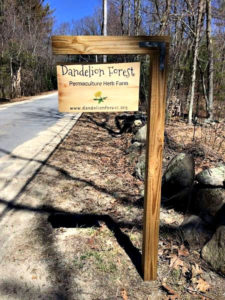
Are you a farmer, gardener, homesteader, consumer, landscaper or food activist?
I consider myself an herbalist/permaculturist (“herbaculturist”) who is very focused on growing food and medicine to heal the body and prevent disease for both humans and the planet. I am not certified organic, but I don’t use any chemical fertilizers or pesticides on my property.
What type of food to do grow, if any? Do you sell it and where?
I grow regular garden produce for the family but I’m focused on herbs, continually adding more medicinals to my property. I have started a permaculture orchard, but it’s young and just starting to produce, although it has an abundance of comfrey, yarrow, apple mint, and valerian. I use most of my herbs to make teas and herbal extracts and I sell them at farmer’s markets, local fairs, and via pick-up/delivery. I have some of my products at Dandelions in Barre, MA and Mountainside Market in Princeton, MA. My dream is to have a pick-on-demand herbal farm, for both medicine and transplants, to supply the freshest-of-fresh products. But I’m just starting out and that part hasn’t manifested yet.
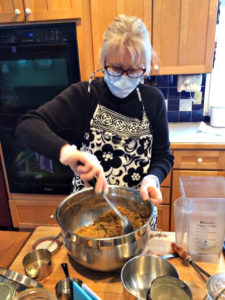
Why do you love local food?
For many reasons, but one of them is that I love the idea of eating in season, and our local food follows that. And, of course, to support our local farmers and a local food economy.
Why do you choose organic?
Because it’s healthier for us and for the planet. And my choices, adding to others’ choices, are helping to make changes in our food system. I’m really excited to see these changes happening.
Why do you love Massachusetts?
This year I’ve traveled to a couple of farming states in the west and mid-west. The landscape is beautiful, but seeing monoculture crops and knowing they are grown using conventional methods makes me sad. I like that Massachusetts has smaller farms, and an ever-increasing number of organic ones. An herbalist friend told me that our state is where the northern forest meets the southern forest and there is a lot of plant diversity. Our climate is perfect for growing things the permaculture way and for foraging in field and forest. That excites me. My goal is to learn to use all the plants around me, focusing on local herbalism.
Recipe: DIY Vegetable Bouillon Powder with Dandelion Forest
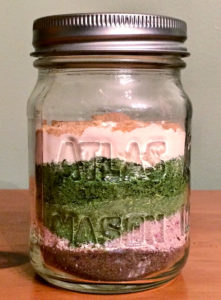
This blend can be made throughout the harvest season, or with dried herbs that have been dehydrated and stored for later use. It utilizes vegetables from my garden throughout the season – so there is no waste! – and at the end I have a healthy, non-MSG, soup starter, which reminds me of my garden every time I use it. Plus, it’s not full of salt, like a lot of the products out there. (I don’t add any salt to mine, but there is no reason why you can’t.)
Ingredients:
The ingredients are flexible, but I like including greens, carrots, and alliums (onions, garlic) as a base.
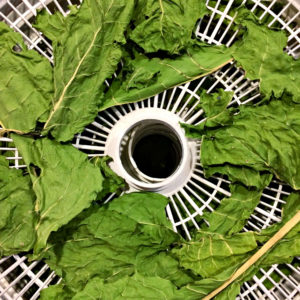
Directions:
- Harvest, wash, and chop your individual veggies of choice into the appropriate format for drying – slice or dice (or in the case of greens, lay the leaves out whole.)
- Dry until all the moisture from the plant is gone. I like to use my dehydrator because it keeps the colors vibrant and the nutrients intact. But you could use the lowest setting of your oven or even sun dry (Tomatoes can be tricky; sometimes I grind them then lay them out on a dehydrator tray to dry some more, then grind again). You want everything to be very dry so you don’t get mold.
- Powder (room temperature) dry ingredient in a food processor or blender.
- Add individual powdered ingredients to a mason jar during the corresponding harvest season. At the end of the year, mix everything together in a clean mason jar to create your vegetable bouillon blend. Keep the jar tightly closed so that moisture doesn’t get in on those humid days. (The powder will sometimes cake, but I just break it up with a fork before measuring it out if that happens.) Hint: if you don’t get enough of some vegetable you would like to have in your bouillon, you can supplement your supply with organic veggies from a farmer or the grocery store. You can also use organic garlic and/or onion spices as a shortcut.
- Add salt, if desired. (I usually use add the salt separately when cooking.)
- To rehydrate, add 1 Tbs bouillon powder to 1 quart of boiling water. Allow to simmer for 10-15 minutes or until herbs and vegetables are fully incorporated into the water. Consume as-is, or use as a soup base or flavoring agent for your favorite recipe.

